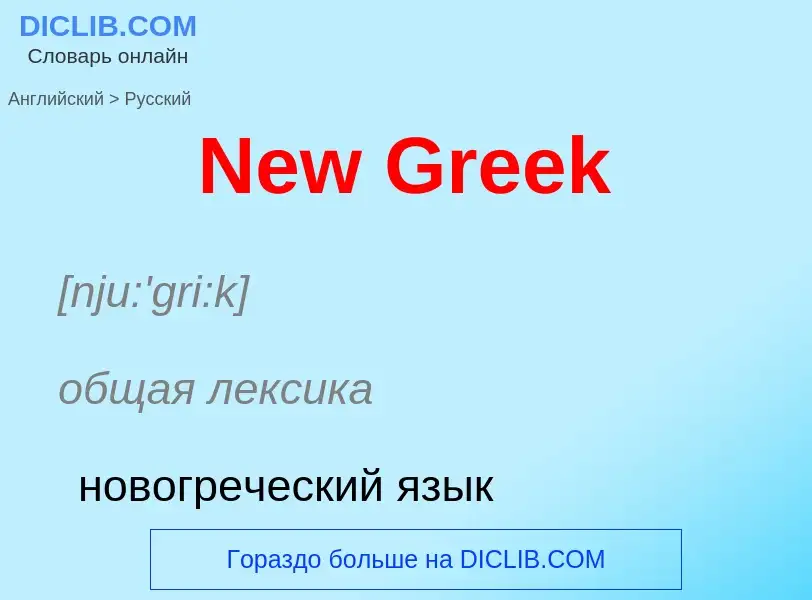Übersetzung und Analyse von Wörtern durch künstliche Intelligenz ChatGPT
Auf dieser Seite erhalten Sie eine detaillierte Analyse eines Wortes oder einer Phrase mithilfe der besten heute verfügbaren Technologie der künstlichen Intelligenz:
- wie das Wort verwendet wird
- Häufigkeit der Nutzung
- es wird häufiger in mündlicher oder schriftlicher Rede verwendet
- Wortübersetzungsoptionen
- Anwendungsbeispiele (mehrere Phrasen mit Übersetzung)
- Etymologie
New Greek - Übersetzung nach russisch
[nju:'gri:k]
общая лексика
новогреческий язык
современный греческий язык
['kɔini]
существительное
лингвистика
койне
Definition
Wikipedia
Modern Greek (Νέα Ελληνικά, Néa Elliniká, [ˈne.a eliniˈka] or Κοινή Νεοελληνική Γλώσσα, Kiní Neoellinikí Glóssa), generally referred to by speakers simply as Greek (Ελληνικά, Elliniká), refers collectively to the dialects of the Greek language spoken in the modern era, including the official standardized form of the languages sometimes referred to as Standard Modern Greek. The end of the Medieval Greek period and the beginning of Modern Greek is often symbolically assigned to the fall of the Byzantine Empire in 1453, even though that date marks no clear linguistic boundary and many characteristic features of the modern language arose centuries earlier, beginning around the fourth century AD.
During most of the Modern Greek period, the language existed in a situation of diglossia, with regional spoken dialects existing side by side with learned, more archaic written forms, as with the vernacular and learned varieties (Dimotiki and Katharevousa) that co-existed in Greece throughout much of the 19th and 20th centuries.

![Pontic]] in orange. [[Cappadocian Greek]] in green, with green dots indicating individual Cappadocian Greek villages in 1910.<ref name="Dawkins, R.M 1916" /> Pontic]] in orange. [[Cappadocian Greek]] in green, with green dots indicating individual Cappadocian Greek villages in 1910.<ref name="Dawkins, R.M 1916" />](https://commons.wikimedia.org/wiki/Special:FilePath/Anatolian Greek dialects.png?width=200)
![Calabrian]] dialects are spoken Calabrian]] dialects are spoken](https://commons.wikimedia.org/wiki/Special:FilePath/GrikoSpeakingCommunitiesTodayV4.png?width=200)

![Greek]], written on [[papyrus]], with its 'most probable date' between 175 and 225. Greek]], written on [[papyrus]], with its 'most probable date' between 175 and 225.](https://commons.wikimedia.org/wiki/Special:FilePath/P46.jpg?width=200)
